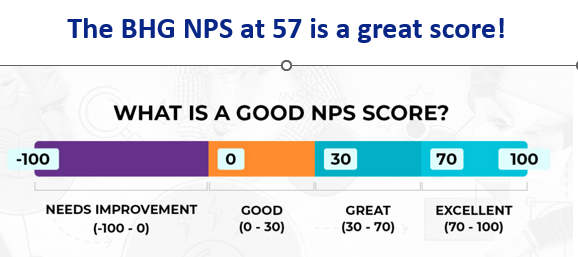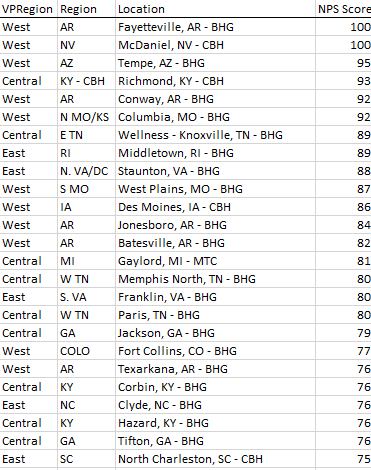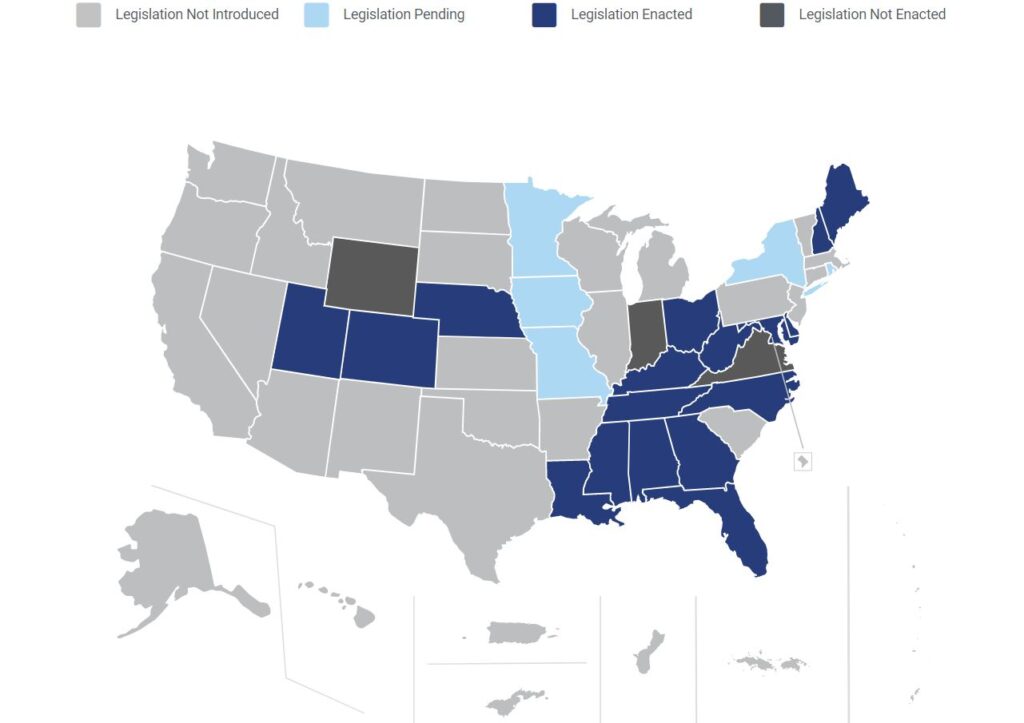BHG Earns High Marks on Net Promoter Score
By Julie Koenig, RN / Chief Operations Officer and Tricia Cross, MS / Senior Clinical and Operations Analyst
For the second year in a row, BHG scored high on the Net Promoter Score (NPS) survey, coming in at 57, which is considered a “Great” score per NPS guidance. More than the overall score, responses to two survey questions went straight to the heart of all we’re doing together to provide excellent experiences that keep patients in treatment. When asked if patients feel like they are treated with respect, 96.28% said “yes.” When asked if they were making progress toward treatment goals and needs, 96.68% replied “yes.” All the hard work, care and support everyone is providing our patients is definitely paying off. Thank you all for what you’re doing to make an impactful difference in so many lives.
What is the Net Promoter Score?
The Net Promoter Score (NPS) measures customer experience and predicts business growth.
NPS data can be obtained by asking a simple question: How likely would you be to recommend a practice to a friend or family member? On a scale of 0 to 10, anyone who answered with a 9 and 10 would be considered a promoter of the business. Anyone with 6 or below is a detractor. The difference between an organization’s promoters and detractors is the NPS score, which can range from -100 on the low end to positive 100 on the high end.[ii]

Below are some standout scores of our Teams. Way to go! Overall, many scores are up from last year, and 83 of our centers fell in the Great or Excellent Score range. That is a major accomplishment! I also want to give a big shout out to Tricia Cross, Senior Clinical Data Analyst, for her amazing work on our survey process this year and with the organization and reporting of our results in Power BI for ease and accessibility.
What each of you do truly matters to our patients, their families, and the communities we serve.

Patient satisfaction vs. patient loyalty
Good healthcare organizations work on their NPS all the time. Satisfaction is largely based on expectations whereas loyalty relates to how likely a person is to repeat business and recommend us to someone else. To dive a little deeper into satisfaction versus loyalty and how NPS is rolled out and results are measured, check out this Healthcare Finance story. All of this is very timely as we model the industry standard for addiction recovery and treatment, expand services and fine-tune our Revenue Cycle Management.
Speaking of loyalty, people come to us during the most difficult and vulnerable times in their lives. To see that 97% of patients say we have improved their quality of life is remarkable. I truly believe they have a loyal connection to us because of the way you all lead with care and compassion.
We appreciate all that you do. We would love for you to share any ideas and patient feedback that would be beneficial to how we can continue making BHG a place where real recovery happens.
[i] The Retently 2021 NPS Benchmark shows the healthcare industry with an average NPS of 38.
[ii] Healthcare Finance, May 2020, 9th paragraph – https://www.healthcarefinancenews.com/news/how-improving-patient-experience-through-net-promoter-scores-can-improve-outcomes-boost-revenue
Interstate Counseling Compact Creating More Career, Patient Opportunities
By Keisha Haynes, MS, LCPC-S / Regional Clinical Director – District of Columbia, Maryland & Virginia
Counseling patients across state lines just got easier. As of July 7, 2022, 16 states have joined the Counseling Compact Commission and enacted the Counseling Compact, an interstate compact, or a contract among states, that allows professional counselors licensed and residing in a compact member state to practice in other compact member states without the need for multiple licenses. Counselors who meet uniform licensure requirements are able to obtain a privilege to practice, which is equivalent to a license to practice counseling in other states. There will be a shared interstate licensure data system, allowing for near-instant verification of licensure status.

Just like insurance, every state’s licensing process and requirements are different. Some states are stricter with more hurdles to jump. However, the Counseling Compact provides a simpler credentialing process between Compact member states. For example, if you’re licensed in a member state like Maryland and want to practice in our North Carolina treatment centers, you can bypass all those challenges.
The Compact is a great step forward for patients, team members and our recruiting efforts because it enhances access to counselors, mobility for counselors, and now with BHG expanding its telehealth services, our team can fill gaps in other states where there are counseling shortages.
In non-member states, it can take anywhere from a few months up to one year to obtain a license in another state due to costs and the back-and-forth paperwork. With this law, that counselor in Virginia, for example, just has to seek privilege to practice and submit a little paperwork and can be up and running to work in Colorado within about 30 days.
Today, more people want flexibility with time and mobility to better suit their lives and career growth. We’re already seeing an increase in applications from other states. This law is perfectly suited to accelerate those positive changes and, I believe, will continue to prove beneficial as BHG expands telehealth and mental health service offerings.
If you haven’t already, I encourage you to see how the Counseling Compact can grow and positively impact your treatment center because, ultimately, it’s helping BHG to continue its mission of creating a new class ofHi recovery that is saving more lives.
Effective Disclore Is a Key to Success
By Carla Adams, Employment Specialist, BHG Denver

Fear of exposure can be a paralyzing experience for individuals in recovery, particularly for those seeking employment. Those with legal barriers to success face the challenge of double exposure. Navigating the disclosure process is a tenuous situation that requires proactive, strategic thought and action.
We can help clients overcome the fear of exposure and navigate the disclosure process in a healthy way by engaging in proactive conversation with questions such as:
- Why are you disclosing?
- What do you desire as the result of your disclosure?
- How might disclosure impact the relationship?
- Are there ways to disclose in a gradual manner to build trust levels?
- How would you respond if someone disclosed similar information to you?
Disclosure can create opportunities
In the arena of employment, disclosure is an individual choice, not a requirement. However, there may be times when disclosure is beneficial.
Under the Americans and Disability Act (ADA), substance use disorder (SUD) is a qualified disability. Many organizations now give preference to individuals with disabilities in their hiring process. For example, the State of Colorado adds an additional five points for candidates with disabilities. Other employers have a preference toward those with disabilities because of the Work Opportunity Tax Credit that helps offset staffing costs.
As the labor market becomes tighter, many organizations are expanding their employment searches to include individuals with legal barriers to success and tapping into resources available through the Federal Bonding Program. Individuals with felonies may find it easier to find work when they proactively and strategically disclose their legal histories.
Some individuals are not comfortable keeping “secrets,” and feel constrained in their relationships when having to monitor the information they share. In these cases, it may be wise to disclose their SUD experience or legal challenges to allow the freedom of open communication in the workplace and other environments.
Disclosure may also be advisable to secure accommodations such as schedule adjustments or modifications in work structure to better suit the individual’s physical, mental, and emotional capacity.
Disclosure comes with risks
Although progress has been made to reduce stigma related to disabilities and legal issues, bias does still exist. Fear of discrimination and negative self-talk can trigger emotional responses and impact relationships before they even start.
A common stigma is that individuals who have criminal backgrounds or SUD are unreliable and not trustworthy. This can be reduced by articulating the many ways the individual has been successful in meeting obligations and taking on responsibility. A reference letter from BHG acknowledging the proactive, positive steps the client has taken may be beneficial.
We can help our clients prepare for tough disclosure conversations with strengths-based questions such as:
- What are some ways to adjust your thoughts and self-talk to create a more powerful message for your future?
- What strengths have you gained through your experience?
- How has your experience better prepared you for success?
- How could you communicate accountability while empowering your future?
Disclosure is an individual choice
Effectively communicating private information is a key to success. Recognizing that the choice is theirs can help clients feel more confident and empowered in their recovery process. Although there are risks, disclosure can create better understanding in relationships and provide opportunities to expand awareness. Many of the lessons learned through the recovery process can be turned into sharable wisdom and inspiration for others.




